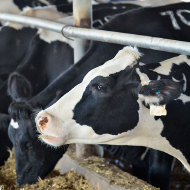Salmonella Dublin present on 40 per cent of British dairy farms

MSD Animal Health has developed a Salmonella Risk Assessment Tool (SRAT) to help vets work alongside their farmers to understand their biosecurity risks.
A new study has revealed that Salmonella Dublin is prevalent on 40 per cent of British dairy farms.
The project by SRUC Veterinary Services in association with MSD Animal Health involved 401 dairy farms from across England, Scotland and Wales.
Researchers performed quarterly bulk milk tank serology for Salmonella Dublin antibodies for over a year, and estimated the overall true prevalence of Salmonella Dublin in the national dairy herd at 40 per cent.
Dr Nicole Baldry, dairy veterinary adviser at MSD Animal Health, said the prevalence is significantly higher than found by previous studies, and shows that Salmonella must be better considered as a potential differential diagnosis and as part of herd health planning and biosecurity.
Dr Baldry said: “Salmonellosis can present with a wide range of clinical signs including abortion, diarrhoea, pneumonia, septicemia, and even joint ills. It can also be present at a subclinical level impacting milk yield and fertility. Therefore, Salmonella should always be on your differential diagnosis list.
“Salmonella Dublin is a very resilient bacteria and can survive for long periods of time in soil and stagnant water, as well as surviving temperature extremes. Animals can also develop carrier status post infection and shed during periods of stress, acting as a continual infection source for herds.”
Salmonella Dublin control principles are very similar to Johnes, and MSD Animal Health has developed a Salmonella Risk Assessment Tool (SRAT) to help vets work alongside their farmers to understand their biosecurity risks.
Dr Baldry added that it’s important for practices to work with their farmers to increase awareness, particularly as it’s a zoonosis.
“A great place to start is by engaging with your farmers to start quarterly bulk milk testing, or screening serology in youngstock or breeding beef stock,” she said. “Salmonellosis is dynamic, therefore regular testing provides a more accurate on-farm picture.”



 The latest
The latest